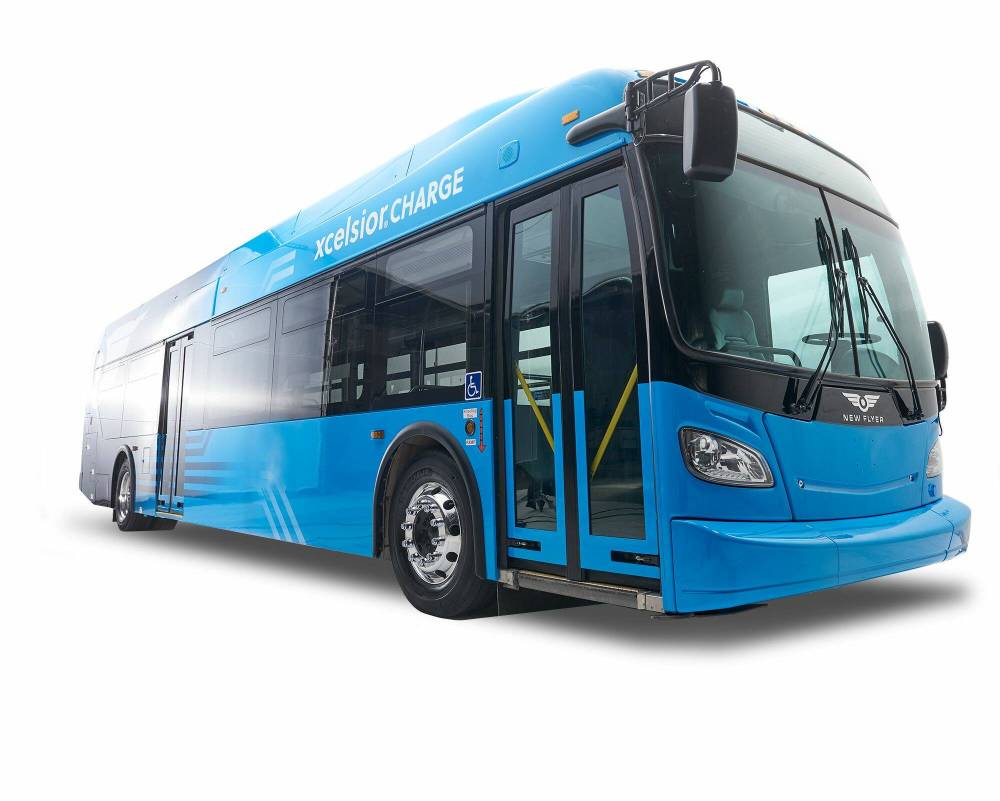Transit rides ‘transformative’ change with first 16 electric buses
Advertisement
Read this article for free:
or
Already have an account? Log in here »
To continue reading, please subscribe:
Monthly Digital Subscription
$0 for the first 4 weeks*
- Enjoy unlimited reading on winnipegfreepress.com
- Read the E-Edition, our digital replica newspaper
- Access News Break, our award-winning app
- Play interactive puzzles
*No charge for 4 weeks then price increases to the regular rate of $19.00 plus GST every four weeks. Offer available to new and qualified returning subscribers only. Cancel any time.
Monthly Digital Subscription
$4.75/week*
- Enjoy unlimited reading on winnipegfreepress.com
- Read the E-Edition, our digital replica newspaper
- Access News Break, our award-winning app
- Play interactive puzzles
*Billed as $19 plus GST every four weeks. Cancel any time.
To continue reading, please subscribe:
Add Free Press access to your Brandon Sun subscription for only an additional
$1 for the first 4 weeks*
*Your next subscription payment will increase by $1.00 and you will be charged $16.99 plus GST for four weeks. After four weeks, your payment will increase to $23.99 plus GST every four weeks.
Read unlimited articles for free today:
or
Already have an account? Log in here »
Hey there, time traveller!
This article was published 25/11/2022 (1119 days ago), so information in it may no longer be current.
Ten years after Winnipeg Transit and New Flyer started a pilot project with four battery-electric buses, the city is now in the final stages of purchasing its first 16 of the state-of-the-art electric buses.
The city’s public works committee is expected to approve the $33-million contract with hometown NFI Group (formerly New Flyer), the leading electric bus maker in North America.
The city is still waiting for final written confirmation of funding from the tri-level Investing in Canada infrastructure Program (ICIP), but Janice Lukes, chair of that committee, said there are no concerns.

Supplied
Winnipeg Transit is preparing to add 16 NFI electric buses to its fleet.
“The funding is in place,” she said. “We’re every excited.”
She said the committee members are all supportive of the project. More than $500 million has been targeted for Winnipeg from the fund, for about 110 electric buses over the next five years, as well as investment for the required charging infrastructure, a new depot and other elements.
NFI officials declined to comment on the project as it is still not completely finalized. In the past, company officials have applauded the availability of both Canadian and U.S. federal funds available to transition transit fleets across North America to electric buses as a significant component in attempts to eliminate greenhouse gas emissions.
Erin Cooke, Winnipeg Transit’s project manager for the Bus Electrification Program, said the process is a big deal for Winnipeg Transit.
“Operationally this is really transformative for us,” she said. “It impacts basically every department here.”
She said the operational roll out planning included the heads of every department to see how the buses will interact or affect current operations.
“The first 16 gives us flexibility to co-operate our diesel buses with the new electric ones without major service interruptions,” she said. “That will give us the first year to figure out how we will be moving forward as we start scaling up at a much more accelerated pace.”
The first part of the contract is for four 40-foot battery electric, four 60-foot battery electric, four 40-foot fuel cell battery electric and four 60-foot fuel cell battery electric buses.
Options for additional electric buses — up to 110 — are part of the contract
A 150 kilowatt charging infrastructure will be built at Winnipeg Transit’s garage on Brandon Avenue.
NFI Group has been transparent about the supply chain issues it has being dealing with which have pushed back its production capabilities across the board.
Cooke said if everything goes according to the current scheduling Winnipeg should be able to start taking delivery of the buses in the summer of 2024 and if NFI’s supply chain issues are rectified sooner, the buses could arrive earlier.
Even though Winnipeg-based NFI is the recognized leader in the industry, these will be the first electric buses purchased by Winnipeg Transit.
Asked if the city received a home-town discount, Cooke said, “Sadly, no, but they are competitive.”
In fact, NFI was the only bidder on the original tender, perhaps partly because the other manufacturers were not able to meet the strict winter performance requirements that were part of the contract.
Winnipeg Transit currently has 640 buses in its fleet and the new electric ones will increase it to 656.
Cooke said the goal is that by the end of the ICIP project to have between 650-to-655 buses with at least 100 of them electric.
“It is a big deal and will be for some number of years,” she said. “This is not an overnight project. It will be dramatic in the first couple of years before they become standard products. But we are looking at retraining our entire workforce. It is interesting times here.”
martin.cash@freepress.mb.ca

Martin Cash has been writing a column and business news at the Free Press since 1989. Over those years he’s written through a number of business cycles and the rise and fall (and rise) in fortunes of many local businesses.
Our newsroom depends on a growing audience of readers to power our journalism. If you are not a paid reader, please consider becoming a subscriber.
Our newsroom depends on its audience of readers to power our journalism. Thank you for your support.




